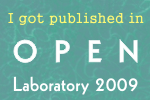Interesting report in Science today about the human skin metagenome. The skin is a fairly large organ, and it is home to an estimated 1012 bacteria. It is the first barrier our body poses against pathogens, toxins, and sarcastic comments. An adult’s skin area is about 2m2, virtually all of it exposed to the outside […]
Displaying posts tagged with
“metagenomics”
The Metagenomics Metadata and Metaanalysis meeting is coming up
By Iddo on April 22nd, 2009
It is fun chairing the program committee of a new meeting: you get all this cutting edge research getting thrown your way. Scientists will submit their latest to meetings, True, it is usually incomplete work and very rough around the edges. But it’s great being one of the first to know what’s cooking in other […]
Challenges with Data Quality, Sharing, and Versioning in Next-Generation Sequencing
By Iddo on March 27th, 2009
An fine talk by David Dooling highlighting some of the false impressions about second generation sequencing. A partial list: Why sequencing quality trump base pair output Why genomes are really probabilities rather than strings Why centralized repositories break down when it comes to second generation sequencing data. Collaborative Software development and versioning has been moving […]
Metagenomes as a diagnostic tool?
By Iddo on February 15th, 2009
Can we learn about an environment by looking at the bacteria living in it? Can we sequence a metagenome, and then say: ”according to the active genes in this water sample it appears to be too rich in metal ions / sewage products / other pollutants” ? In the foreseeable future could we sequence a […]
Every Man an Island, Pt. 2
By Iddo on January 26th, 2009
(Continued from part 1) Why we are islands In the previous post we have seen how our bacterial population affects our weight and that by changing our dietary habits we can change the species composition in our guts. Also, we saw how a metagenomic analysis can lead to verifiable hypotheses: using a metagenomic analysis, Gordon’s […]
Every Man an Island, Pt. 1
By Iddo on January 25th, 2009
No man is an island, entire of itself — John Donne, Meditation XVII Scanning electron microscope images of B. thetaiotaomicron, a prominent human gut bacterium, and the intestine. From: Human Gut Hosts a Dynamically Evolving Microbial Ecosystem Gross L PLoS Biology Vol. 5, No. 7, e199 doi:10.1371/journal.pbio.0050199 Only one out of ten cells in our […]
On Microbial Sequencing
By Iddo on January 11th, 2009
This is the 9th year the NSF & USDA hold a workshop for their microbial sequencing program awardees. (Full disclosure: I am not one of them). Most of the talks are by the awardees themselves, and there were some great talks. For me an interesting angle was it to see how software is being developed […]





